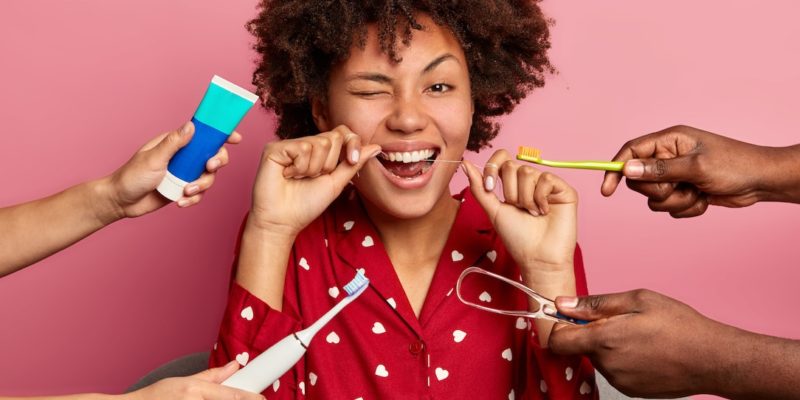Tongue Scraping: Fad or Helpful?

You brush and floss everyday, but is there another way to get your mouth even cleaner? It could be possible with tongue scraping.
You’ve probably seen tongue scraping taking over the pages of all your favorite influencers. Is it safe? Is it just a fad? Can it really be helpful? We’re here to dive into your questions and tell you just how this could become your favorite part of your dental routine. Why? Because it can help with a number of things including: preventing bad breath, improving taste, increasing health, and more.
What is Tongue Scraping?
Tongue scraping is a way to remove debris from the tongue. Over time, bacteria and more can make their home on your tongue. When this adds up, it can cause bad breath and other oral health issues.
What are the Benefits of Tongue Scraping?
Healthline details the benefits of tongue scraping, saying that it:
- Can improve your sense of taste: if it’s been a while since you’ve had a deep-cleaned tongue, you may not notice how it’s affecting your taste buds. Many people notice that by tongue scraping they become more sensitive to sweet, bitter, salty, and other tastes.
- Will improve the appearance of your tongue: if you stick your tongue out right now, what do you see? If you see a white buildup on your tongue, that is excess particles that haven’t been scrubbed away. Tongue scraping can help remove this buildup and prevent it as well.
- Can remove bacteria: it’s been proven that using a tongue scraper twice a day for a week can keep bacteria on the tongue. These bacterias can cause bad breath and tooth decay.
- Improves your overall health: removing bacteria from your mouth can help prevent cavities, gum disease, and other oral conditions.
- Reduces bad breath: it’s been found that scraping was more effective than brushing in some cases at removing odor-causing bacteria that rests on the tongue.
How to Tongue Scrape
Say “ahh!” To begin this process, stand in front of a mirror with your mouth open and tongue out. Then, gently use the tongue scraper, working from the back of the tongue to the front. After each scrape, gently rinse the debris off with warm water. Once you’ve reached the desire cleanliness you’re looking for, wash the tongue scraper with warm soapy water and store.
Risks of Tongue Scraping
The biggest risk of this is irritating your gag reflex, which could induce vomiting. If you have a sensitive gag reflex, don’t start scraping from the back of your tongue. Instead, start from the middle. As you get used to the process, slowly work your starting point back to get the most of your tongue without gagging.
Another risk is the potential of cutting your tongue with the scraper. To protect yourself from cuts, gently scrape. Do not apply much force. You should also inspect your scraper to make sure there are no sharp edges that could potentially harm you during the process.
Tongue Scraping vs. Brushing
The American Dental Association says that tongue scraping isn’t a necessary step. Brushing your teeth twice daily should not be replaced by tongue scraping. If you want to begin scraping, you have to continue brushing and flossing as well. All of these partnered together will help you maintain a happy and healthy mouth.
To incorporate it into your oral health care routine, try this process:
- Brush your teeth for two minutes. While you’re brushing your teeth, you can gently scrub your tongue with the back of the toothbrush head to try and clean the tongue up a bit that way.
- Once you’re done brushing, floss. Make sure you floss between every tooth to remove all debris that could be stuck in between teeth.
- After your mouth is clean from brushing and flossing, tongue scrape with the process we mentioned above.
If you follow this method, you’ll have a sparkling clean mouth. Tongue scraping is a great addition to your dental care routine, but it shouldn’t be used as a substitute for brushing or flossing.
Make an Appointment with Dr. Ania
Dr. Ania wants to make sure every part of your mouth is healthy – from your tongue to your gums. If you notice your tongue has discoloration or other problems after trying to clean your tongue, request an appointment with Dr. Ania. She will go over all your concerns with you. In addition, she can tell you how to supplement your oral healthcare routine even further. If you have more questions about tongue scraping, give Dr. Ania a call at: (303)-872-9940.


